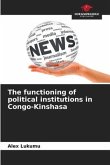- Gebundenes Buch
- Merkliste
- Auf die Merkliste
- Bewerten Bewerten
- Teilen
- Produkt teilen
- Produkterinnerung
- Produkterinnerung
Catastrophes unsettle our safe places within the world. As such, they provide an interesting site to analyze the intersection of our affective and political lives.
Andere Kunden interessierten sich auch für
![What Nazism Did to Psychoanalysis What Nazism Did to Psychoanalysis]() Laurence KahnWhat Nazism Did to Psychoanalysis170,99 €
Laurence KahnWhat Nazism Did to Psychoanalysis170,99 €![The Psychopathology of Political Ideologies The Psychopathology of Political Ideologies]() Robert SamuelsThe Psychopathology of Political Ideologies180,99 €
Robert SamuelsThe Psychopathology of Political Ideologies180,99 €![D.W. Winnicott and Political Theory D.W. Winnicott and Political Theory]() D.W. Winnicott and Political Theory21,99 €
D.W. Winnicott and Political Theory21,99 €![The World as Idea The World as Idea]() Charles P. WebelThe World as Idea180,99 €
Charles P. WebelThe World as Idea180,99 €![Psychoanalysis Under Occupation Psychoanalysis Under Occupation]() Lara SheehiPsychoanalysis Under Occupation180,99 €
Lara SheehiPsychoanalysis Under Occupation180,99 €![The functioning of political institutions in Congo-Kinshasa The functioning of political institutions in Congo-Kinshasa]() Alex LukumuThe functioning of political institutions in Congo-Kinshasa16,99 €
Alex LukumuThe functioning of political institutions in Congo-Kinshasa16,99 €![International Politics and Inner Worlds International Politics and Inner Worlds]() Kurt JacobsenInternational Politics and Inner Worlds19,99 €
Kurt JacobsenInternational Politics and Inner Worlds19,99 €-
-
-
Catastrophes unsettle our safe places within the world. As such, they provide an interesting site to analyze the intersection of our affective and political lives.
Hinweis: Dieser Artikel kann nur an eine deutsche Lieferadresse ausgeliefert werden.
Hinweis: Dieser Artikel kann nur an eine deutsche Lieferadresse ausgeliefert werden.
Produktdetails
- Produktdetails
- Verlag: Routledge
- Seitenzahl: 204
- Erscheinungstermin: 24. November 2023
- Englisch
- Abmessung: 235mm x 157mm x 16mm
- Gewicht: 454g
- ISBN-13: 9781032281599
- ISBN-10: 1032281596
- Artikelnr.: 68473198
- Herstellerkennzeichnung
- Libri GmbH
- Europaallee 1
- 36244 Bad Hersfeld
- gpsr@libri.de
- Verlag: Routledge
- Seitenzahl: 204
- Erscheinungstermin: 24. November 2023
- Englisch
- Abmessung: 235mm x 157mm x 16mm
- Gewicht: 454g
- ISBN-13: 9781032281599
- ISBN-10: 1032281596
- Artikelnr.: 68473198
- Herstellerkennzeichnung
- Libri GmbH
- Europaallee 1
- 36244 Bad Hersfeld
- gpsr@libri.de
Elaine Stavro is Professor Emerita of Political Theory in the Department of Political Studies at Trent University. She has written numerous articles on Simone de Beauvoir, most recently "Why Thoughtfulness Matters Black Lives Matter and Elsewhere," forthcoming (2023), in Simone de Beauvoir: A Toolkit for the 21st Century and published Emancipatory Thinking: The Political Thought of Simone De Beauvoir (2018). Her research interest focuses on feminist thinking, continental philosophy, radical democratic theory, and the intersection of deliberation and affect, as reflected in "SARS and Alterity: The Toronto-China Binary" in Political Science (2014).
List of figures
Acknowledgments
1 Theoretical perspectives on democratic sensibilities and democratic
practices
Vital materialism: ontologies of lively materiality countering social
determinism
Populist thinkers: turning to the political and away from the social
Navigating novelty and indeterminacy - embodied creativity versus the
post-human
Rethinking emotion and affect: challenging autonomous affect
The monstrous event
2 Engendering fear and racism during the SARS epidemic: a defi cit in
deliberative thinking
The event: the impact of fear
Debates that frame this catastrophe
Abjection: scapegoating the Chinese
The Orientalist thesis - essentializing the Asian - linking negative affect
to Social Othering
Media management of the crisis - the pairing of the war on terror and
bioterror
Representations and responses to the SARS crisis: China versus Toronto
From fear to disbelief: challenging WHO's travel advisory
Attending to emotion's material effects
SARS effects on deliberation and democratic decision-making
Toward a more reliable account of the catastrophe: material conditions -
mega slums and global livestock production
Post-SARS
3 Burning inferno: the Grenfell Tower fire in the era of austerity
The event: affective representations overwhelm facts
Confronting vital materialists' and populists' thinking on affect and
emotion
Social weightlessness
Fostering solidarity: a tangled event that produced multiple narratives and
feelings
Challenging earlier narratives - the case for investigative journalism
Applying vital materialism to the event: confederate agency and human
responsibility
A new collective subject fails to emerge
Attending to larger frames of reference
The effects of Brexit - ignoring economic interests
The power of neoliberal governing strategies - the demise of democratic
practices
4 Students' passionate participation: a democratic movement in the digital
age
The terrifying event
The public sphere in the age of internet and social media - the prospect
for democratic opinion formation
MOFL's success: cultivating affective solidarity and pursuing strategic
actions
Differences in social powers: March for Our Lives versus Black Lives Matter
Collaboration across differences: practice surmounts theoretical problems
Striving for a leaderless movement: achievements and compromises
Strategic actions in the face of a history of defeats
The government's response or lack thereof
Gun culture: another impediment to gun control
Institutional and cultural differences matter
5 President Trump's response to the COVID pandemic: a ective ideology and
authoritarian mismanagement
The turn to facts in a world of fear: a veneer of certainty
Eschewing scientific expertise and journalistic critique
Social Othering strategies: blaming the democrats, China, and WHO
Cultivating a divided and uninformed public: the effects of anti-science
and anti-expert sentiments
Efforts to consolidate affective solidarity: "we are all in this together"
#alonetogether
Trump's populism: corporate freedom versus public well-being
Populist leadership: the allure of tough talk
Mishandling of COVID: the erosion of democratic procedures
Addendum
Thinking critically about the pandemic: why were we unprepared?
The promises and perils of the COVID catastrophe
6 The murder of George Floyd and the meteoric rise of Black Lives Matter:
the success of an affectively rich event
Affective solidarity: the power of the event
The appearance of Black Lives Matter: a political movement in the digital
age
Symbolic politics, celebrity support, performative activism - the process
of emotional reorientation
Spontaneous affective events - dismantling statutes waiving public debate
Ambiguity of violence: triggering solidarity and undermining support
The counter-narratives of the alt-right: stoking up fear and loathing
Emotional reflexivity: the power of reason and good arguments
Transforming beliefs: raising awareness of systemic racism
Strategies and ideals of BLM - the complicated path toward instantiating
democratic practices
Moving forward: a case for social democracy or billionaires' charities?
Addendum
Conclusion
Index
Acknowledgments
1 Theoretical perspectives on democratic sensibilities and democratic
practices
Vital materialism: ontologies of lively materiality countering social
determinism
Populist thinkers: turning to the political and away from the social
Navigating novelty and indeterminacy - embodied creativity versus the
post-human
Rethinking emotion and affect: challenging autonomous affect
The monstrous event
2 Engendering fear and racism during the SARS epidemic: a defi cit in
deliberative thinking
The event: the impact of fear
Debates that frame this catastrophe
Abjection: scapegoating the Chinese
The Orientalist thesis - essentializing the Asian - linking negative affect
to Social Othering
Media management of the crisis - the pairing of the war on terror and
bioterror
Representations and responses to the SARS crisis: China versus Toronto
From fear to disbelief: challenging WHO's travel advisory
Attending to emotion's material effects
SARS effects on deliberation and democratic decision-making
Toward a more reliable account of the catastrophe: material conditions -
mega slums and global livestock production
Post-SARS
3 Burning inferno: the Grenfell Tower fire in the era of austerity
The event: affective representations overwhelm facts
Confronting vital materialists' and populists' thinking on affect and
emotion
Social weightlessness
Fostering solidarity: a tangled event that produced multiple narratives and
feelings
Challenging earlier narratives - the case for investigative journalism
Applying vital materialism to the event: confederate agency and human
responsibility
A new collective subject fails to emerge
Attending to larger frames of reference
The effects of Brexit - ignoring economic interests
The power of neoliberal governing strategies - the demise of democratic
practices
4 Students' passionate participation: a democratic movement in the digital
age
The terrifying event
The public sphere in the age of internet and social media - the prospect
for democratic opinion formation
MOFL's success: cultivating affective solidarity and pursuing strategic
actions
Differences in social powers: March for Our Lives versus Black Lives Matter
Collaboration across differences: practice surmounts theoretical problems
Striving for a leaderless movement: achievements and compromises
Strategic actions in the face of a history of defeats
The government's response or lack thereof
Gun culture: another impediment to gun control
Institutional and cultural differences matter
5 President Trump's response to the COVID pandemic: a ective ideology and
authoritarian mismanagement
The turn to facts in a world of fear: a veneer of certainty
Eschewing scientific expertise and journalistic critique
Social Othering strategies: blaming the democrats, China, and WHO
Cultivating a divided and uninformed public: the effects of anti-science
and anti-expert sentiments
Efforts to consolidate affective solidarity: "we are all in this together"
#alonetogether
Trump's populism: corporate freedom versus public well-being
Populist leadership: the allure of tough talk
Mishandling of COVID: the erosion of democratic procedures
Addendum
Thinking critically about the pandemic: why were we unprepared?
The promises and perils of the COVID catastrophe
6 The murder of George Floyd and the meteoric rise of Black Lives Matter:
the success of an affectively rich event
Affective solidarity: the power of the event
The appearance of Black Lives Matter: a political movement in the digital
age
Symbolic politics, celebrity support, performative activism - the process
of emotional reorientation
Spontaneous affective events - dismantling statutes waiving public debate
Ambiguity of violence: triggering solidarity and undermining support
The counter-narratives of the alt-right: stoking up fear and loathing
Emotional reflexivity: the power of reason and good arguments
Transforming beliefs: raising awareness of systemic racism
Strategies and ideals of BLM - the complicated path toward instantiating
democratic practices
Moving forward: a case for social democracy or billionaires' charities?
Addendum
Conclusion
Index
List of figures
Acknowledgments
1 Theoretical perspectives on democratic sensibilities and democratic practices
Vital materialism: ontologies of lively materiality countering social determinism
Populist thinkers: turning to the political and away from the social
Navigating novelty and indeterminacy - embodied creativity versus the post-human
Rethinking emotion and affect: challenging autonomous affect
The monstrous event
2 Engendering fear and racism during the SARS epidemic: a defi cit in deliberative thinking
The event: the impact of fear
Debates that frame this catastrophe
Abjection: scapegoating the Chinese
The Orientalist thesis - essentializing the Asian - linking negative affect to Social Othering
Media management of the crisis - the pairing of the war on terror and bioterror
Representations and responses to the SARS crisis: China versus Toronto
From fear to disbelief: challenging WHO's travel advisory
Attending to emotion's material effects
SARS effects on deliberation and democratic decision-making
Toward a more reliable account of the catastrophe: material conditions - mega slums and global livestock production
Post-SARS
3 Burning inferno: the Grenfell Tower fire in the era of austerity
The event: affective representations overwhelm facts
Confronting vital materialists' and populists' thinking on affect and emotion
Social weightlessness
Fostering solidarity: a tangled event that produced multiple narratives and feelings
Challenging earlier narratives - the case for investigative journalism
Applying vital materialism to the event: confederate agency and human responsibility
A new collective subject fails to emerge
Attending to larger frames of reference
The effects of Brexit - ignoring economic interests
The power of neoliberal governing strategies - the demise of democratic practices
4 Students' passionate participation: a democratic movement in the digital age
The terrifying event
The public sphere in the age of internet and social media - the prospect for democratic opinion formation
MOFL's success: cultivating affective solidarity and pursuing strategic actions
Differences in social powers: March for Our Lives versus Black Lives Matter
Collaboration across differences: practice surmounts theoretical problems
Striving for a leaderless movement: achievements and compromises
Strategic actions in the face of a history of defeats
The government's response or lack thereof
Gun culture: another impediment to gun control
Institutional and cultural differences matter
5 President Trump's response to the COVID pandemic: a ective ideology and authoritarian mismanagement
The turn to facts in a world of fear: a veneer of certainty
Eschewing scientific expertise and journalistic critique
Social Othering strategies: blaming the democrats, China, and WHO
Cultivating a divided and uninformed public: the effects of anti-science and anti-expert sentiments
Efforts to consolidate affective solidarity: "we are all in this together" #alonetogether
Trump's populism: corporate freedom versus public well-being
Populist leadership: the allure of tough talk
Mishandling of COVID: the erosion of democratic procedures
Addendum
Thinking critically about the pandemic: why were we unprepared?
The promises and perils of the COVID catastrophe
6 The murder of George Floyd and the meteoric rise of Black Lives Matter: the success of an affectively rich event
Affective solidarity: the power of the event
The appearance of Black Lives Matter: a political movement in the digital age
Symbolic politics, celebrity support, performative activism - the process of emotional reorientation
Spontaneous affective events - dismantling statutes waiving public debate
Ambiguity of violence: triggering solidarity and undermining support
The counter-narratives of the alt-right: stoking up fear and loathing
Emotional reflexivity: the power of reason and good arguments
Transforming beliefs: raising awareness of systemic racism
Strategies and ideals of BLM - the complicated path toward instantiating democratic practices
Moving forward: a case for social democracy or billionaires' charities?
Addendum
Conclusion
Index
List of figures
Acknowledgments
1 Theoretical perspectives on democratic sensibilities and democratic
practices
Vital materialism: ontologies of lively materiality countering social
determinism
Populist thinkers: turning to the political and away from the social
Navigating novelty and indeterminacy - embodied creativity versus the
post-human
Rethinking emotion and affect: challenging autonomous affect
The monstrous event
2 Engendering fear and racism during the SARS epidemic: a defi cit in
deliberative thinking
The event: the impact of fear
Debates that frame this catastrophe
Abjection: scapegoating the Chinese
The Orientalist thesis - essentializing the Asian - linking negative affect
to Social Othering
Media management of the crisis - the pairing of the war on terror and
bioterror
Representations and responses to the SARS crisis: China versus Toronto
From fear to disbelief: challenging WHO's travel advisory
Attending to emotion's material effects
SARS effects on deliberation and democratic decision-making
Toward a more reliable account of the catastrophe: material conditions -
mega slums and global livestock production
Post-SARS
3 Burning inferno: the Grenfell Tower fire in the era of austerity
The event: affective representations overwhelm facts
Confronting vital materialists' and populists' thinking on affect and
emotion
Social weightlessness
Fostering solidarity: a tangled event that produced multiple narratives and
feelings
Challenging earlier narratives - the case for investigative journalism
Applying vital materialism to the event: confederate agency and human
responsibility
A new collective subject fails to emerge
Attending to larger frames of reference
The effects of Brexit - ignoring economic interests
The power of neoliberal governing strategies - the demise of democratic
practices
4 Students' passionate participation: a democratic movement in the digital
age
The terrifying event
The public sphere in the age of internet and social media - the prospect
for democratic opinion formation
MOFL's success: cultivating affective solidarity and pursuing strategic
actions
Differences in social powers: March for Our Lives versus Black Lives Matter
Collaboration across differences: practice surmounts theoretical problems
Striving for a leaderless movement: achievements and compromises
Strategic actions in the face of a history of defeats
The government's response or lack thereof
Gun culture: another impediment to gun control
Institutional and cultural differences matter
5 President Trump's response to the COVID pandemic: a ective ideology and
authoritarian mismanagement
The turn to facts in a world of fear: a veneer of certainty
Eschewing scientific expertise and journalistic critique
Social Othering strategies: blaming the democrats, China, and WHO
Cultivating a divided and uninformed public: the effects of anti-science
and anti-expert sentiments
Efforts to consolidate affective solidarity: "we are all in this together"
#alonetogether
Trump's populism: corporate freedom versus public well-being
Populist leadership: the allure of tough talk
Mishandling of COVID: the erosion of democratic procedures
Addendum
Thinking critically about the pandemic: why were we unprepared?
The promises and perils of the COVID catastrophe
6 The murder of George Floyd and the meteoric rise of Black Lives Matter:
the success of an affectively rich event
Affective solidarity: the power of the event
The appearance of Black Lives Matter: a political movement in the digital
age
Symbolic politics, celebrity support, performative activism - the process
of emotional reorientation
Spontaneous affective events - dismantling statutes waiving public debate
Ambiguity of violence: triggering solidarity and undermining support
The counter-narratives of the alt-right: stoking up fear and loathing
Emotional reflexivity: the power of reason and good arguments
Transforming beliefs: raising awareness of systemic racism
Strategies and ideals of BLM - the complicated path toward instantiating
democratic practices
Moving forward: a case for social democracy or billionaires' charities?
Addendum
Conclusion
Index
Acknowledgments
1 Theoretical perspectives on democratic sensibilities and democratic
practices
Vital materialism: ontologies of lively materiality countering social
determinism
Populist thinkers: turning to the political and away from the social
Navigating novelty and indeterminacy - embodied creativity versus the
post-human
Rethinking emotion and affect: challenging autonomous affect
The monstrous event
2 Engendering fear and racism during the SARS epidemic: a defi cit in
deliberative thinking
The event: the impact of fear
Debates that frame this catastrophe
Abjection: scapegoating the Chinese
The Orientalist thesis - essentializing the Asian - linking negative affect
to Social Othering
Media management of the crisis - the pairing of the war on terror and
bioterror
Representations and responses to the SARS crisis: China versus Toronto
From fear to disbelief: challenging WHO's travel advisory
Attending to emotion's material effects
SARS effects on deliberation and democratic decision-making
Toward a more reliable account of the catastrophe: material conditions -
mega slums and global livestock production
Post-SARS
3 Burning inferno: the Grenfell Tower fire in the era of austerity
The event: affective representations overwhelm facts
Confronting vital materialists' and populists' thinking on affect and
emotion
Social weightlessness
Fostering solidarity: a tangled event that produced multiple narratives and
feelings
Challenging earlier narratives - the case for investigative journalism
Applying vital materialism to the event: confederate agency and human
responsibility
A new collective subject fails to emerge
Attending to larger frames of reference
The effects of Brexit - ignoring economic interests
The power of neoliberal governing strategies - the demise of democratic
practices
4 Students' passionate participation: a democratic movement in the digital
age
The terrifying event
The public sphere in the age of internet and social media - the prospect
for democratic opinion formation
MOFL's success: cultivating affective solidarity and pursuing strategic
actions
Differences in social powers: March for Our Lives versus Black Lives Matter
Collaboration across differences: practice surmounts theoretical problems
Striving for a leaderless movement: achievements and compromises
Strategic actions in the face of a history of defeats
The government's response or lack thereof
Gun culture: another impediment to gun control
Institutional and cultural differences matter
5 President Trump's response to the COVID pandemic: a ective ideology and
authoritarian mismanagement
The turn to facts in a world of fear: a veneer of certainty
Eschewing scientific expertise and journalistic critique
Social Othering strategies: blaming the democrats, China, and WHO
Cultivating a divided and uninformed public: the effects of anti-science
and anti-expert sentiments
Efforts to consolidate affective solidarity: "we are all in this together"
#alonetogether
Trump's populism: corporate freedom versus public well-being
Populist leadership: the allure of tough talk
Mishandling of COVID: the erosion of democratic procedures
Addendum
Thinking critically about the pandemic: why were we unprepared?
The promises and perils of the COVID catastrophe
6 The murder of George Floyd and the meteoric rise of Black Lives Matter:
the success of an affectively rich event
Affective solidarity: the power of the event
The appearance of Black Lives Matter: a political movement in the digital
age
Symbolic politics, celebrity support, performative activism - the process
of emotional reorientation
Spontaneous affective events - dismantling statutes waiving public debate
Ambiguity of violence: triggering solidarity and undermining support
The counter-narratives of the alt-right: stoking up fear and loathing
Emotional reflexivity: the power of reason and good arguments
Transforming beliefs: raising awareness of systemic racism
Strategies and ideals of BLM - the complicated path toward instantiating
democratic practices
Moving forward: a case for social democracy or billionaires' charities?
Addendum
Conclusion
Index
List of figures
Acknowledgments
1 Theoretical perspectives on democratic sensibilities and democratic practices
Vital materialism: ontologies of lively materiality countering social determinism
Populist thinkers: turning to the political and away from the social
Navigating novelty and indeterminacy - embodied creativity versus the post-human
Rethinking emotion and affect: challenging autonomous affect
The monstrous event
2 Engendering fear and racism during the SARS epidemic: a defi cit in deliberative thinking
The event: the impact of fear
Debates that frame this catastrophe
Abjection: scapegoating the Chinese
The Orientalist thesis - essentializing the Asian - linking negative affect to Social Othering
Media management of the crisis - the pairing of the war on terror and bioterror
Representations and responses to the SARS crisis: China versus Toronto
From fear to disbelief: challenging WHO's travel advisory
Attending to emotion's material effects
SARS effects on deliberation and democratic decision-making
Toward a more reliable account of the catastrophe: material conditions - mega slums and global livestock production
Post-SARS
3 Burning inferno: the Grenfell Tower fire in the era of austerity
The event: affective representations overwhelm facts
Confronting vital materialists' and populists' thinking on affect and emotion
Social weightlessness
Fostering solidarity: a tangled event that produced multiple narratives and feelings
Challenging earlier narratives - the case for investigative journalism
Applying vital materialism to the event: confederate agency and human responsibility
A new collective subject fails to emerge
Attending to larger frames of reference
The effects of Brexit - ignoring economic interests
The power of neoliberal governing strategies - the demise of democratic practices
4 Students' passionate participation: a democratic movement in the digital age
The terrifying event
The public sphere in the age of internet and social media - the prospect for democratic opinion formation
MOFL's success: cultivating affective solidarity and pursuing strategic actions
Differences in social powers: March for Our Lives versus Black Lives Matter
Collaboration across differences: practice surmounts theoretical problems
Striving for a leaderless movement: achievements and compromises
Strategic actions in the face of a history of defeats
The government's response or lack thereof
Gun culture: another impediment to gun control
Institutional and cultural differences matter
5 President Trump's response to the COVID pandemic: a ective ideology and authoritarian mismanagement
The turn to facts in a world of fear: a veneer of certainty
Eschewing scientific expertise and journalistic critique
Social Othering strategies: blaming the democrats, China, and WHO
Cultivating a divided and uninformed public: the effects of anti-science and anti-expert sentiments
Efforts to consolidate affective solidarity: "we are all in this together" #alonetogether
Trump's populism: corporate freedom versus public well-being
Populist leadership: the allure of tough talk
Mishandling of COVID: the erosion of democratic procedures
Addendum
Thinking critically about the pandemic: why were we unprepared?
The promises and perils of the COVID catastrophe
6 The murder of George Floyd and the meteoric rise of Black Lives Matter: the success of an affectively rich event
Affective solidarity: the power of the event
The appearance of Black Lives Matter: a political movement in the digital age
Symbolic politics, celebrity support, performative activism - the process of emotional reorientation
Spontaneous affective events - dismantling statutes waiving public debate
Ambiguity of violence: triggering solidarity and undermining support
The counter-narratives of the alt-right: stoking up fear and loathing
Emotional reflexivity: the power of reason and good arguments
Transforming beliefs: raising awareness of systemic racism
Strategies and ideals of BLM - the complicated path toward instantiating democratic practices
Moving forward: a case for social democracy or billionaires' charities?
Addendum
Conclusion
Index









